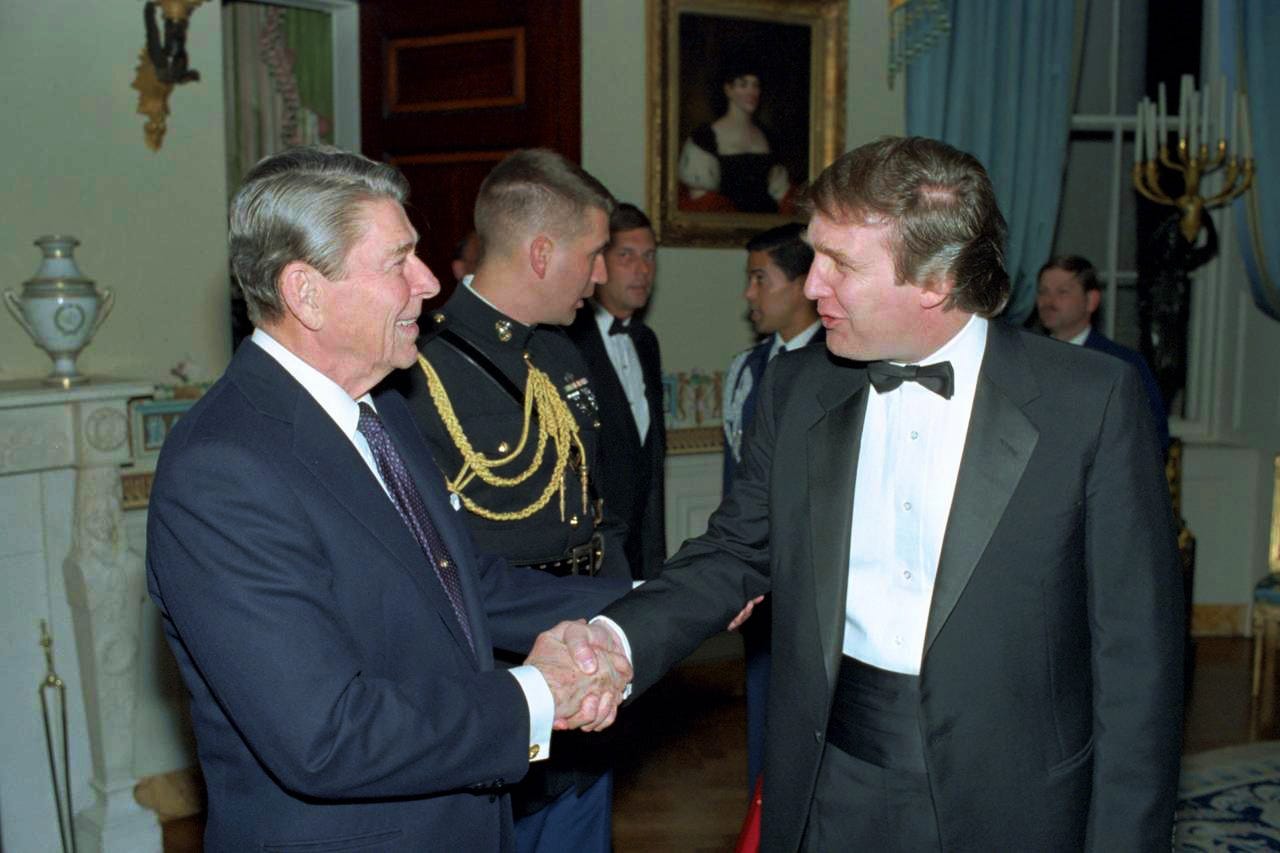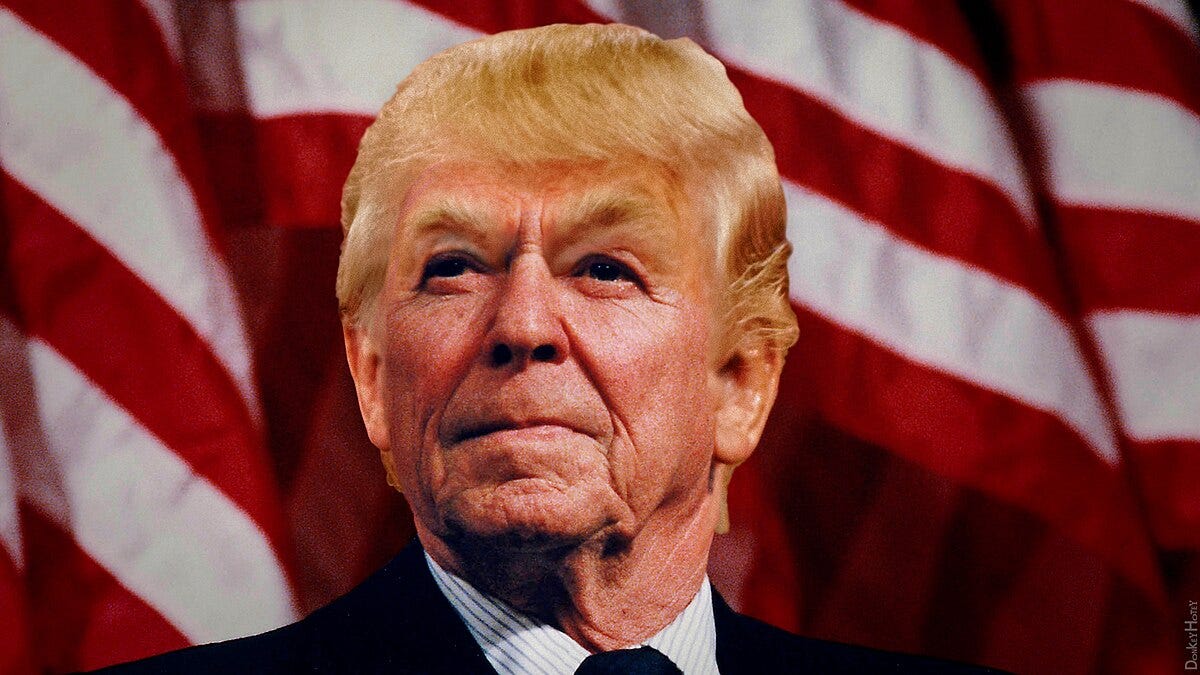
Reader Note: A Personal Reflection on the Stories We Tell Ourselves
Thursdays are usually reserved for book reflections, but this week has been one of personal reflections, so I’m making an exception. On Monday, I wrote about the power of small comforts—how films and familiar rituals help us navigate an uncertain world. Today, I want to explore another kind of comfort: the stories we tell ourselves about history and how they shape our understanding of the present.
I originally planned to set aside the historical connection between Ronald Reagan and Donald Trump, but I’ve changed my mind. The resistance from mainstream centrists to acknowledging this throughline isn’t just an academic dispute—it’s personal. It reflects the limits of imagination that arise when people lack exposure to the communities most affected by these political shifts. It also reflects the power of nostalgia, mythmaking, and selective memory in shaping political identity.
Memory is Selective, But History is Unforgiving
History is the story of our lives—both in the making and the remembering. But memory is often selective. In my preview post, I noted the direct connection between Ronald Reagan’s 1980 campaign slogan, Make America Great Again, and Donald Trump’s modern iteration of the same phrase. At the time, I planned to leave it at that. But I’ve changed my mind—because too many centrist politicians and analysts refuse to acknowledge the throughline between the pathologies that produced Reagan and those that fueled Trump’s rise.
I also want to note that this is not an indictment of the man himself but the flaws of the political machine behind him.
For example, some Democrats invoke a sanitized version of the Reagan years to contrast Trump. It may be politically cheeky (and sometimes savvy), but this tactic is no friend to actual history. A recent example: One Democrat remarked, “As a Cold War kid, I’m thankful it was Reagan and not Trump in office in the 1980s. Trump would have lost us the Cold War.” They even suggested Reagan was “rolling in his grave.”
For a Democrat to invoke Reagan’s legacy—while the party’s base just endured one of the most racist presidential campaigns in modern history—is exactly why so many marginalized communities are questioning their place in the party. Calls to disengage from a party that refuses to take its own voters seriously are growing louder.
There’s no doubt that the Reagan administration’s foreign policy and free trade stance differed from Trump’s. But in today’s post-policy world—where ideology has taken a backseat to cultural and identity-driven politics—this kind of historical whitewashing blurs the connections that matter. The administration’s foreign policy “victories” are often used to overshadow the excesses of his administration. While slashing domestic programs, Reagan’s office dramatically increased defense spending, justifying it with racialized scapegoating of minorities and low-income Americans. By pushing the “welfare queen” myth and championing a self-reliant, Christian, predominantly white “silent majority,” the campaign laid the rhetorical and policy groundwork for the modern GOP’s attacks on Medicaid, Social Security, and government aid.
Even the team’s foreign policy wins aren’t as airtight as the mythology suggests. The administration had the opportunity to eliminate an entire class of nuclear weapons but walked away—not for strategic reasons, but to protect his costly and impractical Strategic Defense Initiative (Star Wars), which was never functional. Meanwhile, the Soviet Union was already collapsing under the weight of its own defense overspending, internal economic dysfunction, and refusal to reckon with disasters like Chernobyl. Reagan also benefited from a willing Soviet premier, Mikhail Gorbachev, who was actively pursuing reforms (Glasnost and Perestroika).
How much of the Cold War’s end was the Reagan administration’s doing, and how much was historical momentum?
Peter Jennings and Todd Brewster framed this question well in their book, The Century:
“It’s hard to determine whether Reagan created the times or the times created him, whether he rallied the public will or simply mirrored it, whether communism collapsed under the weight of his bellicosity or imploded coincidentally at the time of his leadership. But this much is certain: like no other president since FDR, Reagan presided over a dramatic transformation of American life.”
And just like with foreign policy, the administration’s economic policies had long-term consequences. The consensus was free trade absolutism and deregulation, which didn’t just unleash markets—but hollowed out entire communities reliant on extractive industries. The financial devastation that followed didn’t just create resentment; it became fertile ground for the kind of radicalization we see today.
Politicians understandably play the game of winning the news cycle—but that comes at a cost. This kind of historical revisionism erases the harm Reagan’s policies inflicted on marginalized communities, while also dodging the real conversation America needs to have: that the neoliberal consensus he championed is nearly out of solutions. A country reckoning with the failures of its economic model, social fabric, and governing institutions doesn’t need nostalgia—it needs clarity.
Centrists and Never Trumpers are coming to terms with the reality that America has long been a post-policy environment—it didn’t start with Trump. Reagan’s marketing was never just about policy; he was a symbol. A symbol of harmful nostalgia and identitarian positioning that created a direct throughline to Trumpism.
Never Trump Conservatives
To be fair, historical frameworks and ideals serve a purpose. They offer people a way to see the best version of themselves, to believe that following a certain archetype or parable can lead to something greater. That’s an easier view to hold when one hasn’t had to navigate systemic obstacles based on identity.
But for marginalized groups facing a harsh rollback of rights, it’s impossible to view Reagan’s foundation through rose-tinted goggles. The consequences of that legacy aren’t just lessons in a textbook—they are lived experiences, still shaping and haunting our present. Even Max Boot, author, Washington Post columnist, and former Reaganite, has begun to re-evaluate Reagan’s legacy with a more critical eye. In his latest book “Reagan: His Life and Legend,” he grapples with Reagan’s failures on racial conciliation and his preference for inspirational leadership over effective governance. Boot’s reassessment reflects a growing recognition (even among those who once championed Reagan) that the mythology surrounding his presidency has obscured its deeper flaws.
I’ve taken it as a form of academic observation to analyze the Never Trump conservatives, particularly the Weekly Standard alumni who evolved into The Bulwark. It’s been a bittersweet experience. They are intellectually serious in ways today’s conservative movement isn’t, and listening to them reflect on their ideological roots is a reminder that there was once a subset (albeit smaller than many believed) of ideas-focused conservatives. Studying their evolution is valuable as a case study in how movements change, how perspectives shift, and how people grapple with uncomfortable truths.
But beyond that, I have to acknowledge that, in a unique way, Never Trump conservatives have served as mentors—offering encouragement and reinforcement. Even when I disagree with them, they have provided a framework for engaging in rigorous debate, pushing arguments forward, and embracing intellectual curiosity. In a moment when political discourse is often reactionary, their insistence on grappling with ideas—flawed or not—has been instructive.
And, on a personal level, The Bulwark has helped me in ways I won’t forget. They’ve shared my Substack posts at moments when I was struggling with my own sense of ability after leaving Media Matters. That kind of support—especially from people who have little ideological incentive to uplift my work—was a crucial boon. I don’t take that lightly. It’s a reminder that even when we have deep disagreements, there can still be genuine respect, curiosity, and engagement across perspectives. To this day, I highly recommend the publication.
Reagan, Trump, and the Limits of Memory
One of the most frustrating parts of studying the Never Trump conservatives is their lionization of the Reagan years. They will go to the mat defending the choices of the era and insist that Trump is a complete aberration, not a continuation of a longer trajectory.
To quickly rehash:
Reagan launched his campaign in Philadelphia, Mississippi—where civil rights workers had been murdered—using “states’ rights” rhetoric aimed at appealing to white resentment.
As established above, his team pushed the racist “welfare queen” stereotype, a decades-old caricature designed to stoke white fears of Black dependency and justify gutting social programs.
His “Make America Great Again” nostalgia was an implicit call to restore an America before civil rights interventions, before social programs, before demographic shifts.
This wasn’t just rhetorical. The policy changes of this time hollowed out public resources, privatized wealth into homogenous spaces, and deepened racial and economic inequality. Reagan, the man, was the polished, smiling version of Trump’s overt racial appeals, but Trump dispensed with the pretense.
Every time I was confronted with this hagiography, I grew more and more disillusioned. I grew up around church-going Black folk who shared some of the same conservative temperaments that these voices do, but would never be in a coalition with people who were against the legacy of so many in and out of our community who died for American rights. That also means there was a clear understanding of what Ronald Reagan’s campaign messaging and political movement was doing—we saw it up close. The retrenchment into privatization meant that dollars left public spaces and flowed into private ones, often homogenous spaces that had historical advantages from never having faced the same systemic disruptions, communities who disproportionately rely on the public had endured.
The nostalgia that many Never Trumpers still associate with Reaganism was, for us, a rollback of hard-fought progress.
“This Isn’t My Country”
One of the most exhausting refrains of the Trump era has been: “This isn’t my country.”
We heard it in 2016. We heard it again in 2021. And now, in 2025, we’re still hearing it.
But this is the country. It just isn’t the version they wanted to reckon with. The problem isn’t that America suddenly changed—it’s that, for decades, political elites and institutions cultivated distractions or innuendo to prevent people from grappling with the forces that were always there.
The refusal to connect Reaganism and Trumpism is a perfect case study in selective memory. Many centrists want to believe that there was a stable, noble America before Trump hijacked it. But history tells a different story.
So this is why history matters—because bad history leads to bad analysis. If people don’t reckon with the full story, they’ll continue being “shocked” by every escalation, as if it wasn’t there all along.
History Matters Because We Are Living in Its Consequences
The failure to reckon with Reagan’s legacy helped give us Trump. The failure to reckon with Trump’s legacy will determine what comes next.
But this reckoning isn’t just about looking backward—it’s about moving forward. It’s about understanding that history is not fixed, and that choices matter.
There is still a path forward for those willing to fully confront what happened, to look at history honestly, and to learn from it. There is still an opportunity to build something better than what came before. But that requires letting go of myths, embracing hard truths, and resisting the temptation to rewrite history in a more comforting way.
The future doesn’t belong to the fainthearted. That’s what Reagan’s team wrote in one of his most famous speeches. In fact, it’s one of the best speeches in American history.










https://open.substack.com/pub/johnnogowski/p/being-ahead-of-the-curve-aint-that?r=7pf7u&utm_medium=ios